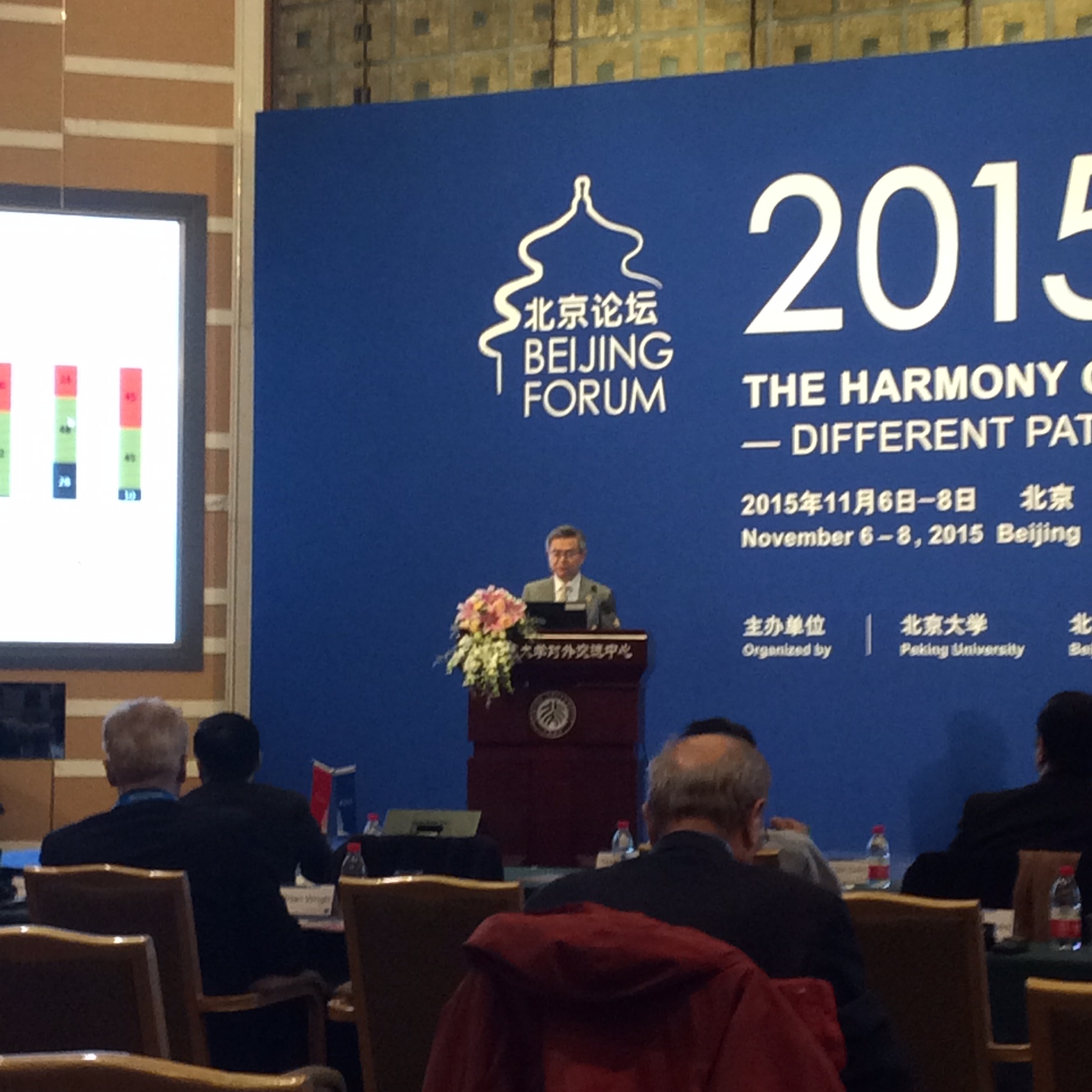Peking University, Nov 8, 2015: On Nov 8 morning, during the fourth session “Innovation and Development” of the panel session “International Cooperation and Development in the New Normal: The One Belt One Road Initiative”, Prof. Xiao Geng from the University of Hong Kong gives a speech on “China’s Evolving Growth Model: The Foshan Story” in the Sunlight Hall of Yingjie Exchange Center. Prof. Xiao introduces and analyzes the growth model of Foshan, a city in Guangdong Province, and says that the Foshan model is replicable in China.
Prof. Xiao begins with the introduction of China’s government matrix: Institution, “Tiao Tiao”-Lines of Central Control, “Kuai Kuai”- Local Jurisdictions, and Growth Cycle. He says that the decentralization of the central government has promoted the development of Foshan. The economy of Foshan also relies on the support of the institutions for enabling both state and market.

Foshan used to be a village, with the government’s support and the evolving of the market and institutions, it has become a big city. During his research of the growth model of Foshan, Prof. Xiao has found a lot of surprises.
The first surprise is that when comparing Foshan’s economy and GDP with other large cities in China, Foshan’s ranking is relatively high in productivity, leverage and affordability. The second surprise is that most practices of Foshan seem replicable. Some situations and challenges in Foshan are quite similar to situations in China, such as the growing migrant population, the housing price problem and the severe competition among districts, towns and villages. In fact, it costs 9 years’ GDP per capita to buy a 100 square meters house in Foshan; in Shanghai, 16 years; in Hong Kong, 32 years.
The third surprise is that what Foshan is faced with is “Swim or Die. No Option”. Foshan has limited resources for its development, and the biggest advantage is that it is close to Hong Kong and Guangzhou geographically. In recent years, Foshan has been investing a lot of money on infrastructure. “If you want to be rich, build roads first.” The development of infrastructure such as industrial central parks promotes the attractiveness of the city and improves the city’s environment. The fourth surprise is that since China has the same problems and challenges as Foshan, Foshan’s solution offers one possible way for China’s development.
Following Prof. Xiao’s speech, Prof. Frank Song of Peking University gives a brief comment, emphasizing the common problems of Foshan and China; and scholars in the floor raise several questions and exchange their ideas regarding the Foshan Growth model.
Background Information:
Xiao Geng is Professor of Practice in Finance and Public Policy at School of Business and Faculty of Social Sciences of the University of Hong Kong. He is also a Member of the Academic Committee of the International Finance Forum (IFF) and an Independent and Non-Executive Director of the Board of HSBC Bank (China).
Previously Xiao Geng held a number of positions in academic and policy institutions, including Senior Fellow and Vice President for China of the Fung Global Institute, Director of the Columbia Global Centers East Asia, Founding Director of the Brookings-Tsinghua Center for Public Policy and Senior Fellow at the Brookings Institution, honorary and tenured professor at School of Economics of HKU, Head of Research and Advisor to the Chairman at the Securities and Futures Commission of Hong Kong, Vice President of the Chinese Economists Society in the U.S., an Independent Director of the London-based Genesis Emerging Markets Fund, a member of the board of supervisors at the Shenzhen Development Bank, a Faculty Associate at Harvard Institute for International Development, and a Consultant at the World Bank.
Written by: Xiao Yunyun
